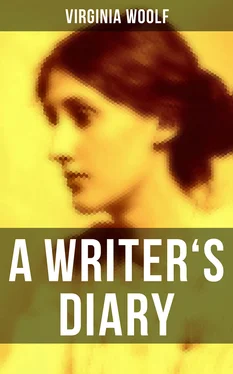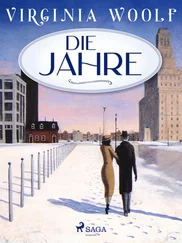1 ...6 7 8 10 11 12 ...19 Lady Carlisle is dead. One likes people much better when they’re battered down by a prodigious siege of misfortune than when they triumph. Such a stock of hope and gifts she set out with, and lost everything (so they say) and died of sleepy sickness, her 5 sons dead before her and the war crushing her hope for humanity.
Wednesday, August 17th.
To while away the time till L. comes in from London, Fergusson, office etc., I may as well scribble. Really I think my scribbling is coming back. Here I have spent the whole day, off and on, making up an article—for Squire perhaps, because he wants a story, and because Mrs Hawkesford has told Mrs Thomsett that I am one of the, if not the, cleverest women in England. It’s not nerve power so much as praise that has lacked, perhaps. Yesterday I was seized with the flux, as the Bible has it. Dr Vallence was fetched, came after dinner, and paid a call. I wish I could write down his conversation. A mild, heavy lidded, little elderly man, son of a Lewes doctor, has always lived here, existing on a few broad medical truths learnt years ago, which he applies conscientiously. He can speak French, as it were, in words of one syllable. As both L. and I knew a good deal more than he did we got upon general topics—old Verrall and how he starved himself purposely to death. ‘I could have had him sent away,’ said Dr V. meditatively. ‘He had been away once. His sister’s away to this day—quite crazy, I believe—a bad family, very bad. I sat with him in your sitting room. We had to sit right into the chimney to get warm. I tried to interest him in chess. No. He didn’t seem able to take an interest in anything. But he was too old—too weak. I couldn’t send him away.’ So he starved himself to death, pottering about his garden.
Crossing his knees and touching his little moustache meditatively now and then, V. then asked me if I did anything? (He thought me a chronic invalid, a fine lady.) I said I wrote. ‘What, novels? Light things?’ Yes, novels. ‘I have another lady novelist among my patients—Mrs Dudeny. I’ve had to buck her up—to fulfil a contract, a contract for a new novel. She finds Lewes very noisy. And then we have Marion Crawford … But Mr Dudeny is the puzzle king. Give him any puzzle—he’ll tell you the answer. He makes up the sort of puzzles shops print on their menus. He writes columns in the papers about puzzles.’
‘Did he help to answer puzzles in the war?’ I asked.
‘Well, I don’t know about that. But a great many soldiers wrote to him—the puzzle king.’ Here he crossed his legs the opposite way. Finally he went and invited L. to join the Lewes Chess Club, which I should very much like to attend myself, these glimpses into different groups always fascinating me intolerably, for I shall never join the party of Dr Vallence and the puzzle king.
Thursday, August 18th.
Nothing to record; only an intolerable fit of the fidgets to write away. Here I am chained to my rock; forced to do nothing; doomed to let every worry, spite, irritation and obsession scratch and claw and come again. This is a day that I may not walk and must not work. Whatever book I read bubbles up in my mind as part of an article I want to write. No one in the whole of Sussex is so miserable as I am; or so conscious of an infinite capacity of enjoyment hoarded in me, could I use it. The sun streams (no, never streams; floods rather) down upon all the yellow fields and the long low barns; and what wouldn’t I give to be coming through Firle woods, dirty and hot, with my nose turned home, every muscle tired and the brain laid up in sweet lavender, so sane and cool, and ripe for the morrow’s task. How I should notice everything—the phrase for it coming the moment after and fitting like a glove; and then on the dusty road, as I ground my pedals, so my story would begin telling itself; and then the sun would be down; and home, and some bout of poetry after dinner, half read, half lived, as if the flesh were dissolved and through it the flowers burst red and white. There! I’ve written out half my irritation. I hear poor L. driving the lawn mower up and down, for a wife like I am should have a latch to her cage. She bites! And he spent all yesterday running around London for me. Still if one is Prometheus, if the rock is hard and the gadflies pungent, gratitude, affection, none of the nobler feelings have sway. And so this August is wasted.
Only the thought of people suffering more than I do at all consoles; and that is an aberration of egotism, I suppose. I will now make out a time table if I can to get through these odious days.
Poor Mdlle Lenglen, finding herself beaten by Mrs Mallory, flung down her racquet and burst into tears. Her vanity I suppose is colossal. I daresay she thought that to be Mdlle Lenglen was the greatest thing in the world; invincible, like Napoleon. Armstrong, playing in the test match, took up his position against the gates and would not move, let the bowlers appoint themselves, the whole game became farcical because there was not time to play it out. But Ajax in the Greek play was of the same temper—which we all agree to call heroic in him. But then everything is forgiven to the Greeks. And I’ve not read a line of Greek since last year, this time, too. But I shall come back, if it’s only in snobbery; I shall be reading Greek when I’m old; old as the woman at the cottagè door, whose hair might be a wig in a play, it’s so white, so thick. Seldom penetrated by love for mankind as I am, I sometimes feel sorry for the poor who don’t read Shakespeare, and indeed have felt some generous democratic humbug at the Old Vic, when they played Othello and all the poor men and women and children had him there for themselves. Such splendour and such poverty. I am writing down the fidgets, so no matter if I write nonsense. Indeed, any interference with the normal proportions of things makes me uneasy. I know this room too well—this view too well—I am getting it all out of focus, because I can’t walk through it.
Monday, September 12th.
I have finished The Wings of the Dove, and make this comment. His manipulation becomes so elaborate towards the end that instead of feeling the artist you merely feel the man who is posing the subject. And then I think he loses the power to feel the crisis. He becomes merely excessively ingenious. This, you seem to hear him saying, is the way to do it. Now just when you expect a crisis, the true artist evades it. Never do the thing, and it will be all the more impressive. Finally, after all this juggling and arranging of silk pocket handkerchiefs, one ceases to have any feeling for the figure behind. Milly thus manipulated disappears. He overreaches himself. And then one can never read it again. The mental grasp and stretch are magnificent. Not a flabby or slack sentence, but much emasculated by this timidity or consciousness or whatever it is. Very highly American, I conjecture, in the determination to be highly bred, and the slight obtuseness as to what high breeding is.
Tuesday, November 15th.
Really, really—this is disgraceful—15 days of November spent and my diary none the wiser. But when nothing is written one may safely suppose that I have been stitching books; or we have had tea at 4 and I have taken my walk afterwards; or I have had to read something for next day’s writing, or I have been out late, come home with stencilling materials and sat down in excitement to try one. We went to Rodmell, and the gale blew at us all day; off arctic fields; so we spent our time attending to the fire. The day before this I wrote the last words of Jacob —on Friday November 4th to be precise, having begun it on April 16, 1920: allowing for 6 months interval due to Monday or Tuesday and illness, this makes about a year. I have not yet looked at it. I am struggling with Henry James’s ghost stories for The Times; have I not just laid them down in a mood of satiety? Then I must do Hardy; then I want to write a life of Newnes; then I shall have to furbish up Jacob; and one of these days, if only I could find energy to tackle the Paston letters, I must start Reading: directly I’ve started Reading I shall think of another novel, I daresay. So that the only question appears to be—will my fingers stand so much scribbling?
Читать дальше











